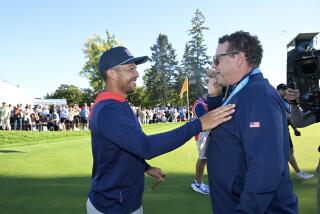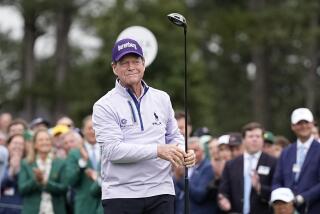No More Mr. Nice Guys in This Cup : Golf: Rivalry has become intense in biennial event that begins today in England.
- Share via
In one of the most dignified moments in Ryder Cup history, perhaps in the history of golf, Jack Nicklaus assured that the 1969 matches between the United States and England would end in a draw by conceding a two-foot putt on the final hole to Tony Jacklin.
“I don’t think you would have missed it,” Nicklaus said, draping his arm around Jacklin’s shoulder. “But I wasn’t going to give you the chance, either.”
It was sportsmanlike and gentlemanly, exactly the sort of gesture one would expect from the world’s greatest player in a sport that values its etiquette even beyond a 350-yard drive by John Daly.
So what happened in the last quarter of a century--or, more specifically, the last decade--to turn the Ryder Cup into an event in which even the prayer becomes a point of contention between the two sides?
“The Americans started losing,” said Bernard Gallacher, the Scotsman who serves as Europe’s nonplaying captain.
Indeed, it is no coincidence that the intensity with which the U.S. players attack the matches has increased at the same rate that their superiority in them has decreased.
With the 30th Ryder Cup competition beginning today and ending Sunday at the Belfry in Sutton Coldfield, England, the United States has a 22-5-2 advantage in a series that began in 1927. But the rivalry was rekindled after 1977, when Nicklaus--whose side is he on, anyway?--said the event faced extinction unless players from other European countries were allowed to join the British side.
Dramatically improved with the addition of players such as Seve Ballesteros and Jose Maria Olazabal of Spain and Bernhard Langer of Germany, the Europeans now are no worse than an even bet. In 140 individual, foursome and best-ball matches since 1983, they have won five more than they have lost.
The Europeans held the Cup for six years, winning in 1985 at the Belfry and in ’87 at Muirfield Village, Ohio, and tying in ’89 at the Belfry, before the United States retrieved it in 1991 at Kiawah Island, S.C.
In hype befitting one of Don King’s boxing promotions, those matches became known as “The War by the Shore.”
The Europeans were amused when some U.S. players wore Desert Storm camouflage caps early in the week, not so amused when a local radio station, launching a “Wake Up the Enemy” campaign, started making pre-dawn phone calls to their hotel rooms and Gallacher discovered Americans listening in to his walkie-talkie transmissions. They also were insulted when a U.S. PGA official, Jim Awtrey, opened a welcoming dinner by praying for a victory by the Americans.
“When the Americans apply themselves to winning something as seriously as they have the Ryder Cup, you know you have to cope with a very, very ruthless animal,” Gallacher said.
Added Ian Woosnam of Wales: “I hope we don’t get any more of that ‘War by the Shore’ stuff we had at Kiawah last time. A load of crap, that is. The Americans got so hyped up that they were going to win whatever way they could, and that’s not in the spirit of the game.”
More disturbing, the European players said, they had to cope with loud, rude, jingoistic crowds that they believed would have been more appropriate for soccer games back home.
U.S. players retort that not only did the English crowds start the cycle of loutish behavior at the Belfry in 1985, sometimes trampling over their balls to make sure they remained buried in the rough, but that it was visitors from Europe among the galleries who created many of the problems at Kiawah Island.
“That was the first time an American crowd behaved anything like the British fans have been doing at the Ryder Cup,” Johnny Miller said. “Now, there are going to be wild, wild galleries at the Belfry with a lot of guys catcalling from the sidelines.”
Enough, declared Tom Watson, the United States’ nonplaying captain in requesting a truce.
“I know this week’s matches will be played under a great deal of stress,” he said. “But my hope is that they will be conducted in the manner golf should be played.
“As long as the etiquette and dignity of the matches don’t suffer, I don’t mind the partisan ‘us against them’ attitude. But some of the things that go on are out of the scope of the etiquette of the game, and I think the game suffers because of that. I think galleries cheering bad shots and booing good shots exacerbates the situation.
“We’re at a boiling point, and it could boil over. It’s happened in all other sports. It doesn’t need to be in golf.”
Not everyone agrees. In a commentary for Golf magazine, Dave Kindred wrote: “Dignity, we’ve got plenty of. It’s great golf we need. For that we need more passion, not less. Give us more clamorous heat, not less.”
He would have appreciated the scene this week at the traditional welcome dinner that brings together the teams before they meet on the course. The Europeans’ feelings were hurt by the refusal of the U.S. players to participate in the ritual of exchanging autographs. But at least the prayer this time was neutral because so, presumably, is He.
Facts and Figures
* AT STAKE: Ryder Cup.
* PRIZE MONEY: None.
* OPPONENTS: United States and Europe.
* DATES: Today through Sunday.
* VENUE: The par 36-36--72, 7,177-yard Brabazon course at the Belfry, Sutton Coldfield, England.
* FORMAT: Match play. Twenty-eight matches, one point each match; one-half point to each team for matches tied after 18 holes.
The matches are designated as foursomes, four ball and singles. A look at the terminology:
--Foursomes: Two-man teams hit alternate shots in 18 holes of match play.
--Four ball: The best score of a two-man team on each hole in match play.
--Singles: Traditional match play.
* TODAY: Four foursomes matches, four four-ball matches.
Foursome pairings (pairings for afternoon’s four-ball matches will not be announced until after the morning competition):
--Tom Kite-Davis Love III (U.S.) vs. Seve Ballesteros-Jose Maria Olazabal.
--Lanny Wadkins-Corey Pavin (U.S.) vs. Sam Torrance-Mark James.
--Paul Azinger-Payne Stewart (U.S.) vs. Ian Woosnam-Bernhard Langer.
--Ray Floyd-Fred Couples (U.S.) vs. Nick Faldo-Colin Montgomerie.
* SATURDAY: Four foursomes matches, four four-ball matches.
* SUNDAY: 12 singles matches.
* POINTS NEEDED TO WIN: 14 1/2.
* CUP HOLDER: United States (retains the Cup if teams tie).
* SERIES HISTORY: United States has won 22 times; Europe (before 1979, Britain) has won five times; twice they have tied.
* TEAM CAPTAINS: United States--Tom Watson. Europe--Bernard Gallacher, England.
* UNITED STATES TEAM: Paul Azinger, Chip Beck, John Cook, Fred Couples, Ray Floyd, Jim Gallagher, Lee Janzen, Tom Kite, Davis Love III, Corey Pavin, Payne Stewart, Lanny Wadkins.
* EUROPEAN TEAM: Peter Baker, England; Seve Ballesteros, Spain; Nick Faldo, England; Joakim Haeggman, Sweden; Mark James, England; Barry Lane, England; Bernhard Langer, Germany; Colin Montgomerie, Scotland; Jose Maria Olazabal, Spain; Constantino Rocca, Italy; Sam Torrance, Scotland; Ian Woosnam, Wales.
* TELEVISION: Today--8 a.m. (delayed) USA Network. Saturday--11 a.m. (delayed), Channel 4. Sunday--8 a.m. (delayed), Channel 4
More to Read
Go beyond the scoreboard
Get the latest on L.A.'s teams in the daily Sports Report newsletter.
You may occasionally receive promotional content from the Los Angeles Times.










